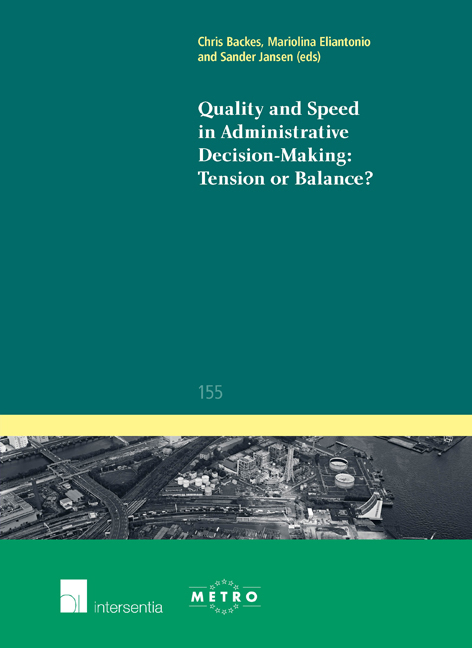Book contents
- Frontmatter
- Contents
- List of Authors
- List of Abbreviations
- Introduction
- Quality and Speed in Administrative Decision-Making: A German Case Study
- The Quest for Quality and Speed in Italian Administrative Law Or the Tale of some Elusive Targets
- Quality and Speed in Administrative Decision-Making: A French Case Study
- Planning for Major Infrastructure in England: Front-Loading Participation in the Interests of Efficiency
- Quality and speed in Judicial Procedures and Administrative Decision-Making: Environmental Permits in Sweden
- Faster and Better!? Decision-Making in the Netherlands
- Conclusions
- Ius Commune Europaeum
Quality and Speed in Administrative Decision-Making: A German Case Study
Published online by Cambridge University Press: 12 December 2017
- Frontmatter
- Contents
- List of Authors
- List of Abbreviations
- Introduction
- Quality and Speed in Administrative Decision-Making: A German Case Study
- The Quest for Quality and Speed in Italian Administrative Law Or the Tale of some Elusive Targets
- Quality and Speed in Administrative Decision-Making: A French Case Study
- Planning for Major Infrastructure in England: Front-Loading Participation in the Interests of Efficiency
- Quality and speed in Judicial Procedures and Administrative Decision-Making: Environmental Permits in Sweden
- Faster and Better!? Decision-Making in the Netherlands
- Conclusions
- Ius Commune Europaeum
Summary
Introduction
Measures have been taken to speed up administrative decision-making procedures in Germany since the early 1990s. The drive for the efforts to do so came from the need to (1) rapidly improve the infrastructure of the new German federal states (Länder) after reunification, and (2) to remove what the government and industrial lobby groups considered to be obstructions to economic investment. In the same time period a vague notion of minimizing ‘bureaucracy’ flooded the political debate in the EU and within a number of Member States. This has led to ongoing activities such as the passing of deregulation rules which aim to abolish laws regarded as an unnecessary burden for the economy. There is some criticism of this overloaded ‘anti-bureaucracy’ movement.
At the beginning the application of some of these deregulation laws was restricted regionally to the new Länder and temporally. But eventually there was an expansion in scope to include all of Germany and they were made permanent.
The peak of the deregulation movement had been reached in 2011. After that an opposite current commenced, aimed at improving the legal instruments that enable participation of citizens, especially in planning procedures for infrastructure. Intensive local protest movements like ‘Stuttgart 21’ against railway and urban development and local opposition against measures in the context of the sustainable energy transition (Energiewende) triggered legislative action and debates.
This contribution deals with the ambiguous relationship between the speed of administrative procedures and the quality of administrative decision-making (section 2) and analyses the measures that are taken to speed up procedures (sections 3 and 4). Two categories of measures can be distinguished here.
The first category includes measures of a general scope: these are not specific to a certain sector (such as environmental law) but concern administrative procedures as such (section 3). In this category two types of rules need to be differentiated and placed in subcategories: the rules governing the administrative procedure before an administrative act is adopted by the competent authority are laid down in the German Administrative Procedure Act (Verwaltungsverfahrensgesetz) and the rules governing the judicial review of these decisions before the courts are laid down in the German Administrative Court Procedure Act (Verwaltungsgerichtsordnung).
- Type
- Chapter
- Information
- Publisher: IntersentiaPrint publication year: 2016



